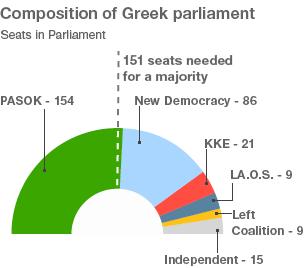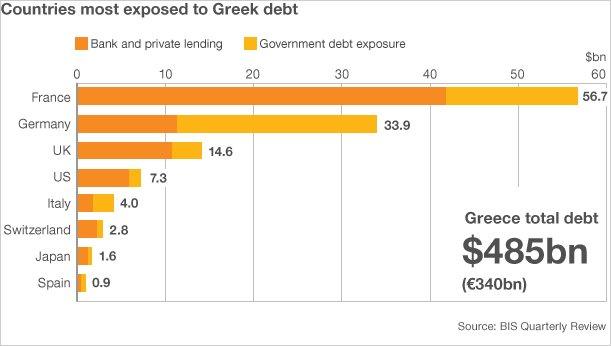Greece: MPs pass second austerity vote
- Published
The BBC's Jon Sopel says our buses have returned to Syntagma Square
Greece's parliament has passed a second vote on its austerity programme, which was needed to secure the country further financial support.
The vote approved putting into practice the tax hikes, pay cuts, privatisations and public sector redundancies approved in principle on Wednesday.
Greek PM George Papandreou hailed its passage as "a crucial step" for Greece.
The EU welcomed the result, external, which came despite a two-day nationwide strike and violent protests in Athens this week.
Had the package been rejected, Greece could have run out of money within weeks.

The EU and the International Monetary Fund had demanded that the measures be implemented before they extend further loans to Greece.
With the votes passed, Greece can now receive the latest 12bn-euro (£10.8bn) tranche of a 110bn-euro loan, instead of defaulting.
"We have still many difficult and crucial battles ahead of us," Mr Papandreou told a cabinet meeting after Thursday's bill was passed by 155 votes to 136.
His ruling Panhellenic Socialist Movement (Pasok) has a slim parliamentary majority, with 154 out of 300 deputies.
European Commission President Jose Manuel Barroso and European Council President Herman Van Rompuy hailed the result as a "decisive step Greece needed to take in order to return to a sustainable path".
"In very difficult circumstances, it was another act of national responsibility," they side, in reference to the violent protests in Athens that injured some 300 people.
Vote of confidence?
Greece's package of tax rises and budget cuts is worth about 28bn euros over five years.
Now its implementation has been improved, Eurozone finance ministers will start finalising the details of a second bail-out designed to help Greece pay its debts until the end of 2014.
This is likely to be approved over the weekend, correspondents say.
Finance Minister Evangelos Venizelos said he was "very satisfied" with the result.
"I can go to Eurogroup strengthened by a vote of confidence and two approved bills," he told Reuters news agency.
But analysts say the real challenge will come after the loan is secured, and there is concern about whether the austerity measures can be effectively implemented in the face of so much public hostility.
As Greek MPS were voting, German Finance Minister Wolfgang Schaeuble said German banks and insurers had agreed to participate in a plan to continue lending to Athens, following a similar decision by French lenders.
Mr Schaeuble said German institutions would contribute 3.2bn euros to the plan.
Calm returns
Wednesday's vote - which was approved in principle by 155 votes to 138 - had prompted a furious response from protesters in Athens.
Masked rioters - armed with sticks and stones - fought running battles with riot police firing tear gas and stun grenades.
Clashes had continued on Syntagma (Constitution) Square outside parliament overnight.
But calm returned after daybreak, with protesters replaced by street-cleaning crews removing debris left after two days of battles in the square.
Police had restricted access to the city centre to prevent demonstrators from obstructing members of parliament heading to vote on the new law.
Some Athenians have accused the police of heavy-handed tactics and the excessive use of tear gas; Greek newspapers on Thursday railed against what one called "an orgy of state terror".
Scores of people have been treated for injuries and severe breathing problems.
Concessions offered
The measures in Thursday's enabling legislation include an introduction of income tax for low paid workers, an increase of sales tax, and pay cuts for civil servants.
Some Socialist MPs had said they would vote against individual clauses such as an increase in heating oil levy and a rise in the minimum tax threshold.
Before the vote, Mr Venizelos had offered some concessions on tax, one of the most contentious parts of the package.
Greek unions are angry that the government's austerity programme will impose taxes on those earning the minimum wage, following months of other cuts that have seen unemployment rise to more than 16%.
